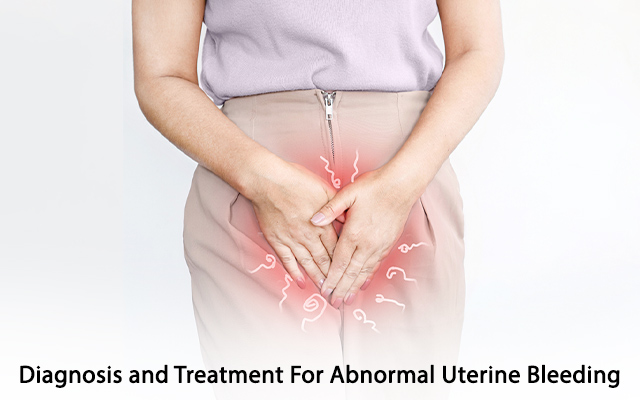Abnormal uterine bleeding can range from various underlying causes. It refers to changes in a woman’s menstrual cycle, like bleeding between periods, irregular periods and heavy bleeding. Some of the common diagnostic tests and treatments for this condition have been stated below.
Diagnosis of Abnormal Uterine Bleeding
At first, the doctor will conduct a thorough evaluation in order to diagnose abnormal uterine bleeding. The process usually starts with a detailed physical examination and a discussion regarding your medical history. He will further ask you regarding the duration, timing and volume of bleeding along with any associated symptoms like fatigue and pain.
Common diagnostic tests include the following:
- Ultrasounds: A pelvic ultrasound helps check the uterus and diagnose conditions like polyps, fibroids or structural abnormalities.
- Blood tests: These tests are also conducted to check thyroid function, anemia and hormone levels, like estrogen and progesterone.
- Endometrial Biopsy: If there is a concern about abnormal tissue growth, a biopsy might be performed to examine a sample of the uterine lining.
- Sonohysterography: During this test, the doctor injects a saline solution into the uterus at the time of ultrasound to better view the lining of the uterus for any abnormalities.
- Hysteroscopy: This test involves the insertion of a small camera into the uterus for visual inspection of any uterine abnormalities.
Reach out to our gynecology hospital in Dumdum to connect with our doctors and determine the underlying cause of your abnormal uterine bleeding.
Treatments
Treatments for abnormal uterine bleeding mainly depend on the underlying cause, the severity of the symptoms, the woman’s age and her reproductive goals. Know about these treatments in detail below.
- Non-hormonal medications: For women who cannot undergo hormonal treatments, doctors recommend non-steroidal anti-inflammatory drugs to reduce pain and bleeding.
- Hormonal therapy: Hormone therapy and birth control pills are usually recommended by doctors to regulate the menstrual cycle. It also helps control bleeding. Doctors suggest this treatment particularly for hormonal imbalances like endometrial hyperplasia and PCOS.
- Surgical options: In severe cases of abnormal uterine bleeding, surgery may be necessary. Procedures like endometrial ablation, hysterectomy and myomectomy are often recommended if other treatments fail and if the patient is at risk of cancer.
- Lifestyle modifications: Lifestyle changes like exercise, stress reduction and weight management will help regulate symptoms and minimize the severity of symptoms.
It’s essential to consult a gynecologist if you notice any abnormal uterine bleeding. You can seek obstetrics and gynecology treatment in Dumdum at our hospital for an effective outcome.



